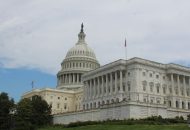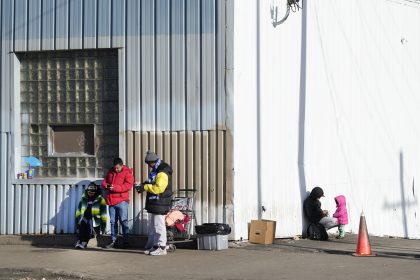Justice Department Changed Hiring to Promote Restrictive Immigration Judges

WASHINGTON — The Department of Justice has quietly changed hiring procedures to permanently place immigration judges repeatedly accused of bias to a powerful appellate board, adding to growing worries about the politicization of the immigration court system.
Documents obtained through Freedom of Information Act requests suggest that an already opaque hiring procedure was tweaked for the six newest hires to the 21-member Board of Immigration Appeals. All six board members, added in August, were immigration judges with some of the highest asylum denial rates. Some also had the highest number of decisions in 2017 that the same appellate body sent back to them for reconsideration. All six members were immediately appointed to the board without a yearslong probationary period.
“They’re high-level deniers who’ve done some pretty outrageous things (in the courtroom) that would make you believe they’re anti-immigrant,” said Jeffrey Chase, a former immigration judge and past senior legal adviser at the board. “It’s a terrifying prospect. … They have power over thousands of lives.”
Among the hiring documents are four recommendation memos to the Attorney General’s office from James McHenry, director of the Executive Office for Immigration Review, which oversees the nation’s immigration court system.
The memos, dated July 18, recommend immigration judges William A. Cassidy, V. Stuart Couch, Earle B. Wilson, and Keith E. Hunsucker to positions on the appellate board. McHenry’s memos note new hiring procedures had been established on March 8, to vet “multiple candidates” expressing interest in the open board positions.
A footnote in the memos states that applicants who are immigration judges would be hired through a special procedure: Instead of going through the typical two-year probationary period, they would be appointed to the board on a permanent basis, immediately. This was because a position on the appellate board “requires the same or similar skills” as that of an immigration judge, according to the memo.
Appellate board members, traditionally hired from a variety of professional backgrounds, are tasked with reviewing judicial decisions appealed by the government or plaintiff. Their decisions, made as part of a three-member panel, can set binding precedents that adjudicators and immigration judges rely on for future cases related to asylum, stays of deportation, protections for unaccompanied minors and other areas.
McHenry, appointed in 2018 by then-Attorney General Jeff Sessions, concludes his recommendation memos by noting that the judge’s “current federal service was vetted and no negative information that would preclude his appointment” was reported. He does not mention any past or pending grievances, although public complaints have been filed against at least three of the judges.
These documents, obtained through FOIA via Muckrock, a nonprofit, collaborative that pushes for government transparency, reflect “the secrecy with which these rules are changing,” said Matthew Hoppock, a Kansas City-based immigration attorney. “It’s very hard to remove or discipline a judge that’s permanent than when it’s probationary, so this has long term implications.”
The Department of Justice declined to answer a series of questions asked by CQ Roll Call regarding the new hiring practices, why exemptions were made in the case of these immigration judges and whether complaints against any of the judges were considered.
“Board members, like immigration judges, are selected through an open, competitive, and merit-based process involving an initial review by the Office of Personnel Management and subsequent, multiple levels of review by the Department of Justice,” a DOJ official wrote via email. “This process includes review by several career officials. The elevation of trial judges to appellate bodies is common in almost every judicial system, and EOIR is no different.”
When the department posted the six board vacancies in March, the openings reflected the first time that board members would be allowed to serve from immigration courts throughout the country. Previously, the entire appellate board worked out of its suburban Virginia headquarters.
In addition, the job posts suggested that new hires would be acting in a dual capacity: They may be asked to adjudicate cases at the trial court level and then also review the court decisions appealed to the board. Previously, board members stuck to reviewing appeals cases, a process that could take more than a year.
Ultimately, all six hires were immigration judges, although past board candidates have come from government service, private sector, academia and nonprofits.
“This was stunning,” MaryBeth Keller, chief immigration judge until she stepped down this summer, said in a recent interview with The Asylumist, a blog about asylum issues. “I can’t imagine that the pool of applicants was such that only (immigration judges) would be hired, including two from the same city.”
Keller said immigration judges are “generally eminently qualified to be board members, but to bring in all six from the immigration court? I’d like to think that the pool of applicants was more diverse than that.”
Paul Wickham Schmidt, a retired immigration judge who headed the board under President Bill Clinton, said the panel always had arbitrary hiring procedures that changed with each administration and suffered from “quality control” issues. But the Trump administration has “pushed the envelope the furthest,” he said.
“This administration has weaponized the process,” he told CQ Roll Call. “They have taken a system that has some notable weaknesses in it and exploited those weaknesses for their own ends.”
The reputation and track record of the newest immigration judges has also raised eyebrows.
According to an analysis of EOIR data by the Transactional Records Access Clearinghouse at Syracuse University, each of these newest six judges had an asylum denial rate over 80 percent, with Couch, Cassidy, and Wilson at 92, 96, and 98 percent, respectively. Nationally, the denial rate for asylum cases is around 57 percent. Previous to their work as immigration judges, all six had worked on behalf of government entities, including the Department of Homeland Security, Department of Justice and the military.
“It mirrors a lot of the concerns at the trial level,” said Laura Lynch, senior policy counsel at the American Immigration Lawyers Association (AILA). She said several new hires at the trial level have been Immigration and Customs Enforcement attorneys.
“Every day across the country, people’s lives hang in the balance waiting for immigration judges to decide their fate,” she said. “Asylum grant rates for immigration court cases vary widely depending on the judge, suggesting that outcomes may turn on which judge is deciding the case rather than established principles and rules of law.”
Immigration experts note that denial rates depend on a variety of factors, including the number and types of cases that appear on a judge’s docket. Perhaps a better measure of an immigration judge’s decision-making may be the rate that rulings get returned by the appeals board.
For 2017, the last full year for which data is available, Couch and Wilson had the third and fourth highest number of board-remanded cases — at 50 and 47 respectively, according to federal documents obtained by Bryan Johnson, a New York-based immigration lawyer. The total number of cases on their dockets that year were 176 and 416, respectively.
Some of the behavior by the newer judges also has earned them a reputation. In 2018, AILA obtained 11 complaints against Cassidy that alleged prejudice against immigrant respondents. In a public letter the Southern Poverty Law Center sent last year to McHenry, the group complained that Cassidy bullied migrants in his court. He also asked questions that “exceeded his judicial authority,” Center lawyers wrote.
Another letter, sent in 2017 by SPLC lawyers and an Emory University law professor whose students observed Cassidy’s court proceedings, noted the judge “analogized an immigrant to ‘a person coming to your home in a Halloween mask, waving a knife dripping with blood’ and asked the attorney if he would let that person in.”
SPLC also has documented issues with Wilson, noting how he “routinely leaned back in his chair, placed his head in his hands and closed his eyes” during one hearing. “He held this position for more than 20 minutes as a woman seeking asylum described the murders of her parents and siblings.”
Couch’s behavior and his cases have made news. According to Mother Jones, he once lost his temper with a 2-year-old Guatemalan child, threatening to unleash a dog on the boy if he didn’t stop making noise. But he is perhaps better known as the judge who denied asylum to “Ms. A.B.,” a Salvadoran domestic violence survivor, even after the appellate board asked him to reconsider. Sessions, the attorney general at the time, ultimately intervened and made the final precedent-setting ruling in the case.
Couch has a pattern of denying asylum to women who have fled domestic violence, “despite clear instructions to the contrary” from the appellate board, according to Johnson, the immigration lawyer who said Couch “has been prejudging all claims that have a history of domestic violence, and quite literally copying and pasting language he used to deny other domestic violence victims asylum.”
Jeremy McKinney, a Charlotte-based immigration lawyer and second vice president at AILA, went to law school with Couch and called him “complex.” While he was reluctant to characterize the judge as “anti-immigrant,” he acknowledged “concerning” stories about the Couch’s court demeanor.
“In our conversations, he’s held the view that asylum is not the right vehicle for some individuals to immigrate to the U.S. — it’s one I disagree with,” McKinney said. “But I feel quite certain that that’s exactly why he was hired.”
Increasingly, political appointees are “micromanaging” the dockets of immigration judges, said Ashley Tabaddor, head of the union National Association of Immigration Judges. Appointees also are making moves that jeopardize their judicial independence, she said. Among them: requiring judges to meet a quota of 700 completed cases per year; referring cases even if they are still in the midst of adjudication to political leadership, including the Attorney General, for the final decision; and seeking to decertify the immigration judges’ union.
These are “symptoms of a bigger problem,” Tabaddor said. “If you have a court that’s situated in the law enforcement agency … that is the fundamental flaw that needs to be corrected.”
In March, the American Bar Association echoed calls by congressional Democrats to investigate DOJ hiring practices in a report that warned the department’s “current approach will elevate speed over substance, exacerbate the lack of diversity on the bench, and eliminate safeguards that could lead to a resurgence of politicized hiring.”
“Moreover, until the allegations of politically motivated hiring can be resolved, doubt will remain about the perceived and perhaps actual fairness of immigration proceedings,” the organization wrote. “The most direct route to resolving these reasonable and important concerns would be for DOJ to publicize its hiring criteria, and for the inspector general to conduct an investigation into recent hiring practices.”
———
©2019 CQ-Roll Call, Inc., All Rights Reserved
Visit CQ Roll Call at www.rollcall.com
Distributed by Tribune Content Agency, LLC.
























